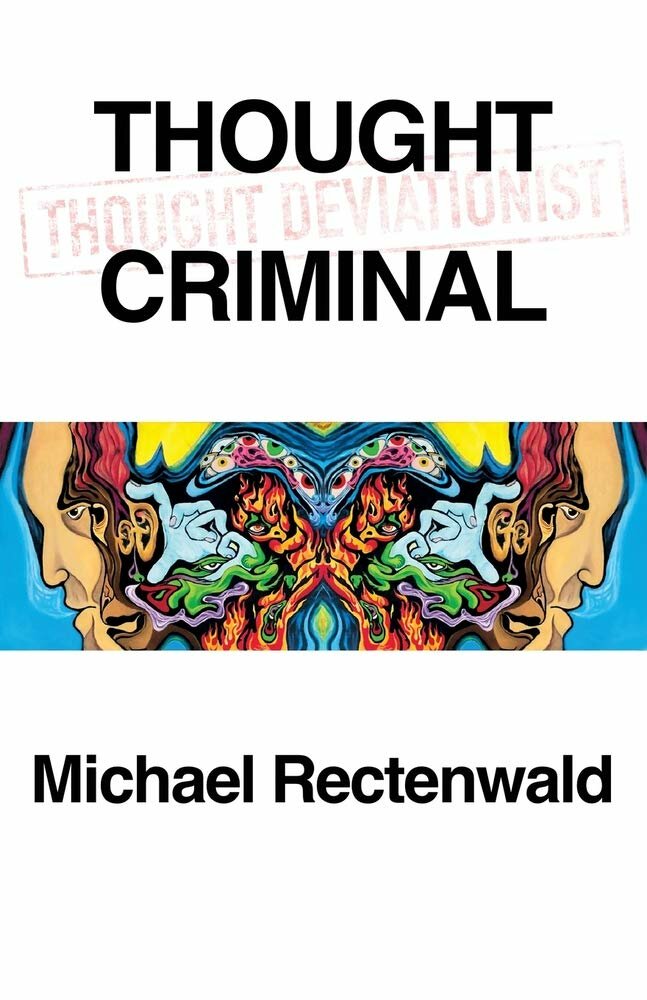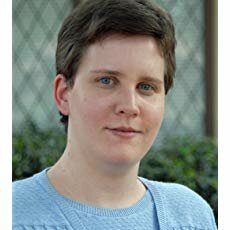Doctor Michael Rectenwald’s most recent book is the dystopian sci-fi novel “Thought Criminal” which I read as part of the Unsafe Space book club. “Thought Criminal” is his first science fiction novel, but it is far from his first book. He’s the author of eleven books including “Google Archipelago: The Digital Gulag and the Simulation of Freedom” and “Beyond Woke”. And I had the pleasure of interviewing him.
Tamara Wilhite: The world-building in the novel “Thought Criminal” is fantastic. You explain how they could use a nanotech virus to literally control human thoughts, while the measures to control the virus are used to control the general population. Did you write this novel during the coronavirus lockdowns?
Dr. Rectenwald: Thank you, Tamara. Yes, the lockdowns really sparked my imagination. The desolation was otherworldly and surreal. I knew I had to write about this aspect of the Covid crisis, and fiction seemed to be the best way to do so. I’ve treated other aspects in non-fiction essays but fiction serves as a much better vehicle for treating the experiential. The virus also struck me as a profound metaphor for thought control. As I observed the mass control brought about by the Covid response, it occurred to me to figure the virus not only as a biological threat in the novel but also as an ideological one. After all, if nothing else, SARS-2 is being used to control thought and behavior.
Tamara Wilhite: I’ve read about Fintech considering using your search history to create a better credit score and banks like Chase deciding to stop doing business based on “reputational risk”. Could that lead to a Sesame Credit type system here? And what happens if businesses and/or the state have access to all of that data?
Dr. Rectenwald: I think we are well on the way to a social credit scoring system in the West, and I imagine that the Corona viruses/vaccines will be the pretext for instituting it here, but I can see the possibility that one’s online behavior could also be figured in. After all, it’s already happening. As it is, Google uses our searches as means for manipulating us and nudging us to the “correct” ideas. Surely they are using algorithms that effectively rate us on a social justice credit scoring system. It’s just not being used against us yet, as far as I know.
Tamara Wilhite: Can you tell me about your book “Google Archipelago”? I believe that’s along the same vein.
Dr. Rectenwald: “Google Archipelago” (hereafter GA) traces the metastasis of social ideology into the digital realm. It may be regarded as the second in a series of installments on social justice, a series that I began in “Springtime for Snowflakes”, and which I continued in a third book, “Beyond Woke”, thus completing a trilogy.
The book represents a study of the vastly extended and magnified manifestation of the leftist authoritarian-totalitarian ideology as it expands into cyberspace, extends throughout the cyber-social body, and penetrates the deepest recesses of social and political life. In GA, I connect Big Digital’s politics with its technologies. I argue and demonstrate that the technologies are intrinsically leftist and authoritarian.
For reasons I give in the book, the only way to make sense of the politics of such organizations as Google, Facebook, Twitter, et al and how this politics is reflected in its technologies is to see Big Digital as the leading edge of an economic and governmental conglomeration that aims to monopolize human life on a global scale. Big Digital represents the ideological communications apparatus for establishing a two-tiered system consisting of global corporate-cum-state monopolies on top, with “actually-existing socialism” for everyone else. I call this two-tiered system “corporate socialism,” which I choose over the term “techno-feudalism,” used by others. I have very good reasons for adopting the name corporate socialism rather than techno-feudalism, not the least of which is the penchant of the monopolists for using socialist rhetoric and ideology in their attempts to bring the two-tiered system into existence. Ultimately, corporate socialism would amount to a singular, one-world state, with vast globalist monopolies controlling production, as is the case in “Thought Criminal”. These monopolies would be paralleled by a socialism or “equality” of reduced expectations for everyone else.
In GA, I suggest that we no longer “go on” the Internet but rather live within it. It is ubiquitous and all-encompassing, so yes, this ties the book to “Thought Criminal”, where every move and even every thought may be known and even predicted by the controlling technocracy.
Ultimately, Big Digital attempts to replace reality with a digital simulation or simulations, simulacra posing as substitutes for reality—to introduce simulated and faux realities or simulacra that displace and replace the real.
Tamara Wilhite: You’ve written nonfiction critiques of social justice such as “Beyond Woke” and “Springtime for Snowflakes: “Social Justice” and Its Postmodern Parentage”. What led a Professor of Liberal Studies and Global Liberal Studies at NYU to write these books? It is quite a departure from an analysis of the history of British secularism.
Dr. Rectenwald: Well, to be frank, the social justice warriors themselves led me to write these books. After I criticized wokeness in an interview for the NYU student newspaper in the fall of 2016, I was roundly attacked and condemned. This attack really woke me up, as it were. It caused me to rethink my entire worldview and orientation. I had a complete gestalt shift. My political outlook went from Marxist to civil libertarian, almost overnight. I found a new mission and research agenda and began analyzing social justice–just where it came from, and what its assumptions and objectives are. That’s what these books explore. Springtime for Snowflakes is a memoir that traces the roots of the social justice movement vis-a-vis an exploration of my own master’s and doctoral education in Critical Theory and Postmodern theory and related fields. Beyond Woke is a collection of stand-alone essays written over a four-year period beginning in 2016, when I had my falling out with the academic and broader left. “Beyond Woke” has been described as the “greatest hits of Michael Rectenwald” by a reader. “Springtime for Snowflakes” was highly praised for the interleaving of biographical and theoretical material. I suggest that readers new to my work begin with one of these two.
While I’m fairly happy with these three books, I must say that “Springtime for Snowflakes” is the best of them, as I see it. But it does involve treading through some dense theoretical ideas in the two central chapters, Chapters 5 and 6. I’m almost never satisfied with my writing, but I am pretty close to being satisfied with this one.
By the way, there is a connection between my work on secularism and my work on social justice; I see social justice as a religious movement and call for a higher order “post-secularism” in order to manage it.
Tamara Wilhite: What are you working on now?
Dr. Rectenwald: I’m writing a series of essays on the Great Reset for the Mises Institute, and articles for other outlets. I’m also giving a lot of interviews and recharging my batteries while gathering my thoughts for my next book-length foray. I may or may not publish a book this year. I hope I can be excused if I don’t; I published four books over the past two years. My son admonished me recently that I actually need to slow down my production. I’m trying to decide whether to write another novel, perhaps as part of a series beginning with Thought Criminal, or to go back to non-fiction. It’s a tough choice because fiction is much more difficult for me, although more satisfying in many ways.
Tamara Wilhite: Is there anything you’d like to add?
Dr. Rectenwald: Give “Thought Criminal” a chance. It’s an allegory for our times.
Tamara Wilhite: Thank you for speaking with me.



Comments